A Report on Developing Operational Management Skills for Healthcare
VerifiedAdded on 2021/02/19
|11
|3872
|19
Report
AI Summary
This report delves into the critical aspects of developing operational management skills within the healthcare sector. It begins by outlining the roles and responsibilities of healthcare operational managers, emphasizing their connection between patients and staff, and their oversight of healthcare service functions. The report highlights the importance of various personal skills, such as communication and strategic planning, for effective leadership in healthcare operations. It then explores different leadership theories, including trait, behavioral, and situational theories, and their practical applications within healthcare practices. The report further examines how these theories support different management styles, such as autocratic, authoritative, and persuasive approaches. Finally, it addresses conflict resolution strategies, providing insights into managing issues within diverse healthcare contexts. The analysis uses Elsie Health and Social Care as a case study to illustrate the application of these concepts in real-world scenarios, providing a comprehensive overview of operational management in healthcare.
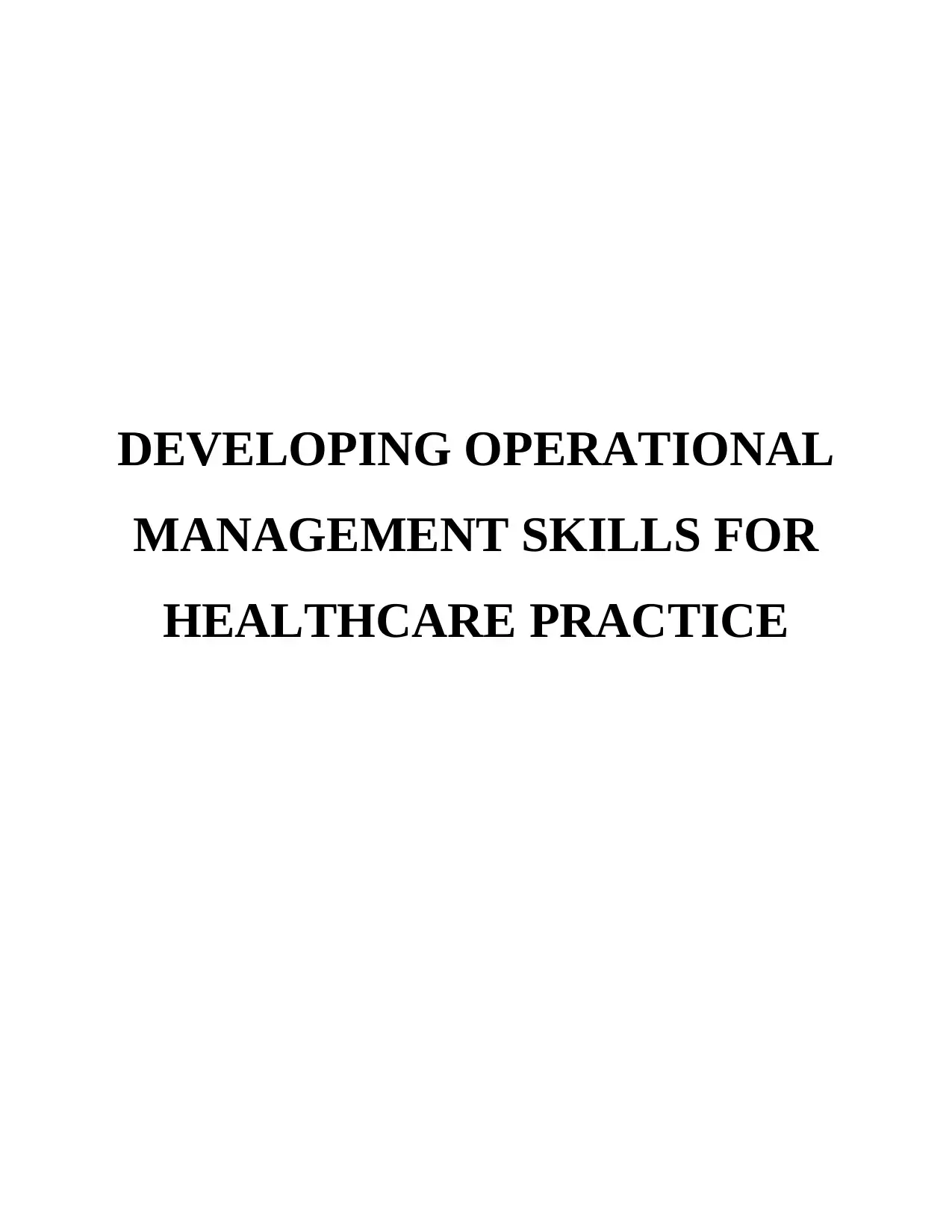
DEVELOPING OPERATIONAL
MANAGEMENT SKILLS FOR
HEALTHCARE PRACTICE
MANAGEMENT SKILLS FOR
HEALTHCARE PRACTICE
Paraphrase This Document
Need a fresh take? Get an instant paraphrase of this document with our AI Paraphraser
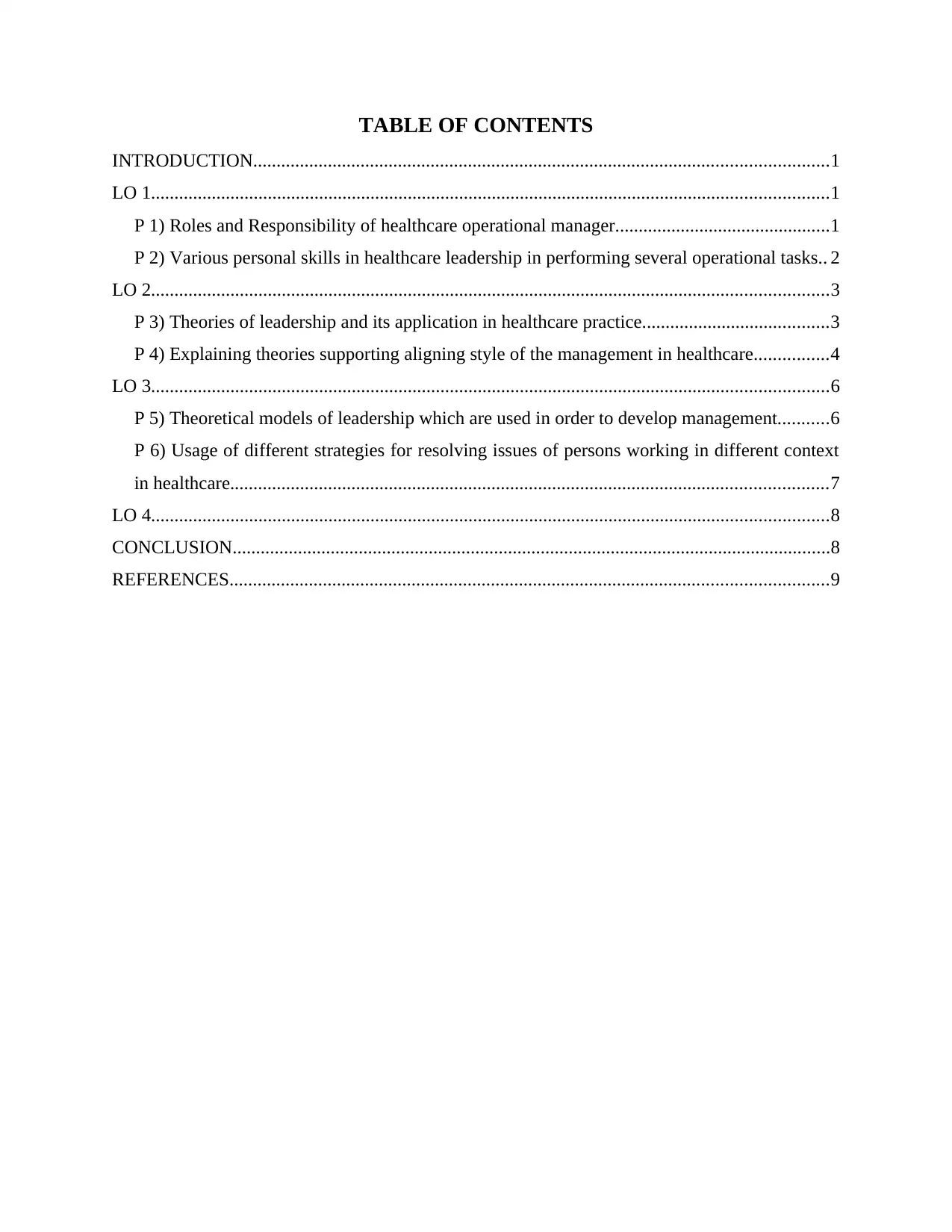
TABLE OF CONTENTS
INTRODUCTION...........................................................................................................................1
LO 1.................................................................................................................................................1
P 1) Roles and Responsibility of healthcare operational manager..............................................1
P 2) Various personal skills in healthcare leadership in performing several operational tasks.. 2
LO 2.................................................................................................................................................3
P 3) Theories of leadership and its application in healthcare practice........................................3
P 4) Explaining theories supporting aligning style of the management in healthcare................4
LO 3.................................................................................................................................................6
P 5) Theoretical models of leadership which are used in order to develop management...........6
P 6) Usage of different strategies for resolving issues of persons working in different context
in healthcare................................................................................................................................7
LO 4.................................................................................................................................................8
CONCLUSION................................................................................................................................8
REFERENCES................................................................................................................................9
INTRODUCTION...........................................................................................................................1
LO 1.................................................................................................................................................1
P 1) Roles and Responsibility of healthcare operational manager..............................................1
P 2) Various personal skills in healthcare leadership in performing several operational tasks.. 2
LO 2.................................................................................................................................................3
P 3) Theories of leadership and its application in healthcare practice........................................3
P 4) Explaining theories supporting aligning style of the management in healthcare................4
LO 3.................................................................................................................................................6
P 5) Theoretical models of leadership which are used in order to develop management...........6
P 6) Usage of different strategies for resolving issues of persons working in different context
in healthcare................................................................................................................................7
LO 4.................................................................................................................................................8
CONCLUSION................................................................................................................................8
REFERENCES................................................................................................................................9

INTRODUCTION
Operational management plays a significant role in the management of healthcare
institution as well, as it focus on handling the several issues of the organisation such as,
preventing patients from disease, ensure protection of the patients, security and safety of patients,
enriching the quality of lives of the patients (Shanks, ed, 2016). This study describes role and
duties or responsibilities of the healthcare operational manager of Elsie Health and Social Care.
This study emphasizes on the need of skills which is prioritised in the leaders while performing
the operational tasks. Further this study discusses the different theories and models of leadership
in the context of healthcare practices and their application in different leadership styles and for
its development. This study also outlines the different strategies for solving the conflicts.
LO 1
P 1) Roles and Responsibility of healthcare operational manager.
An operational manager of healthcare institution will act as a connection between the
patients and staff of healthcare unit. Commonly, an operational manager of healthcare unit
overlook the functioning of services provided by the unit. Manager of the operational activities
of healthcare unit will manage the need of funds for the facilities of healthcare, implements the
policies and maintain or manage the overall staff including non-medical and medical personnel
(Adebanjo, Laosirihongthong and Samaranayake, 2016). Following are some role and
responsibilities of healthcare operational managers:-
Role of operational manager:-
Monitoring healthcare services-
The operational manager of Elsie Health and Social Care will perform his role by
monitoring and managing the services which are especially related to health. The overall
functioning of health services which includes:- promotion of health, preventing patients from
diseases, diagnosis of the patients, treatment and recovering the patients (Gopee and Galloway,
2017). These all activities will be monitored by the operational manager of Elsie Health and
Social Care.
Making Strategic Plans-
To maintain the sustainability of Elsie Health and Social Care, the operational manager
need to have the ability to forecast the future requirement of the management. Strategic planning
must be effective which ensures the better health services to the receivers of the services i.e;
1
Operational management plays a significant role in the management of healthcare
institution as well, as it focus on handling the several issues of the organisation such as,
preventing patients from disease, ensure protection of the patients, security and safety of patients,
enriching the quality of lives of the patients (Shanks, ed, 2016). This study describes role and
duties or responsibilities of the healthcare operational manager of Elsie Health and Social Care.
This study emphasizes on the need of skills which is prioritised in the leaders while performing
the operational tasks. Further this study discusses the different theories and models of leadership
in the context of healthcare practices and their application in different leadership styles and for
its development. This study also outlines the different strategies for solving the conflicts.
LO 1
P 1) Roles and Responsibility of healthcare operational manager.
An operational manager of healthcare institution will act as a connection between the
patients and staff of healthcare unit. Commonly, an operational manager of healthcare unit
overlook the functioning of services provided by the unit. Manager of the operational activities
of healthcare unit will manage the need of funds for the facilities of healthcare, implements the
policies and maintain or manage the overall staff including non-medical and medical personnel
(Adebanjo, Laosirihongthong and Samaranayake, 2016). Following are some role and
responsibilities of healthcare operational managers:-
Role of operational manager:-
Monitoring healthcare services-
The operational manager of Elsie Health and Social Care will perform his role by
monitoring and managing the services which are especially related to health. The overall
functioning of health services which includes:- promotion of health, preventing patients from
diseases, diagnosis of the patients, treatment and recovering the patients (Gopee and Galloway,
2017). These all activities will be monitored by the operational manager of Elsie Health and
Social Care.
Making Strategic Plans-
To maintain the sustainability of Elsie Health and Social Care, the operational manager
need to have the ability to forecast the future requirement of the management. Strategic planning
must be effective which ensures the better health services to the receivers of the services i.e;
1
⊘ This is a preview!⊘
Do you want full access?
Subscribe today to unlock all pages.

Trusted by 1+ million students worldwide
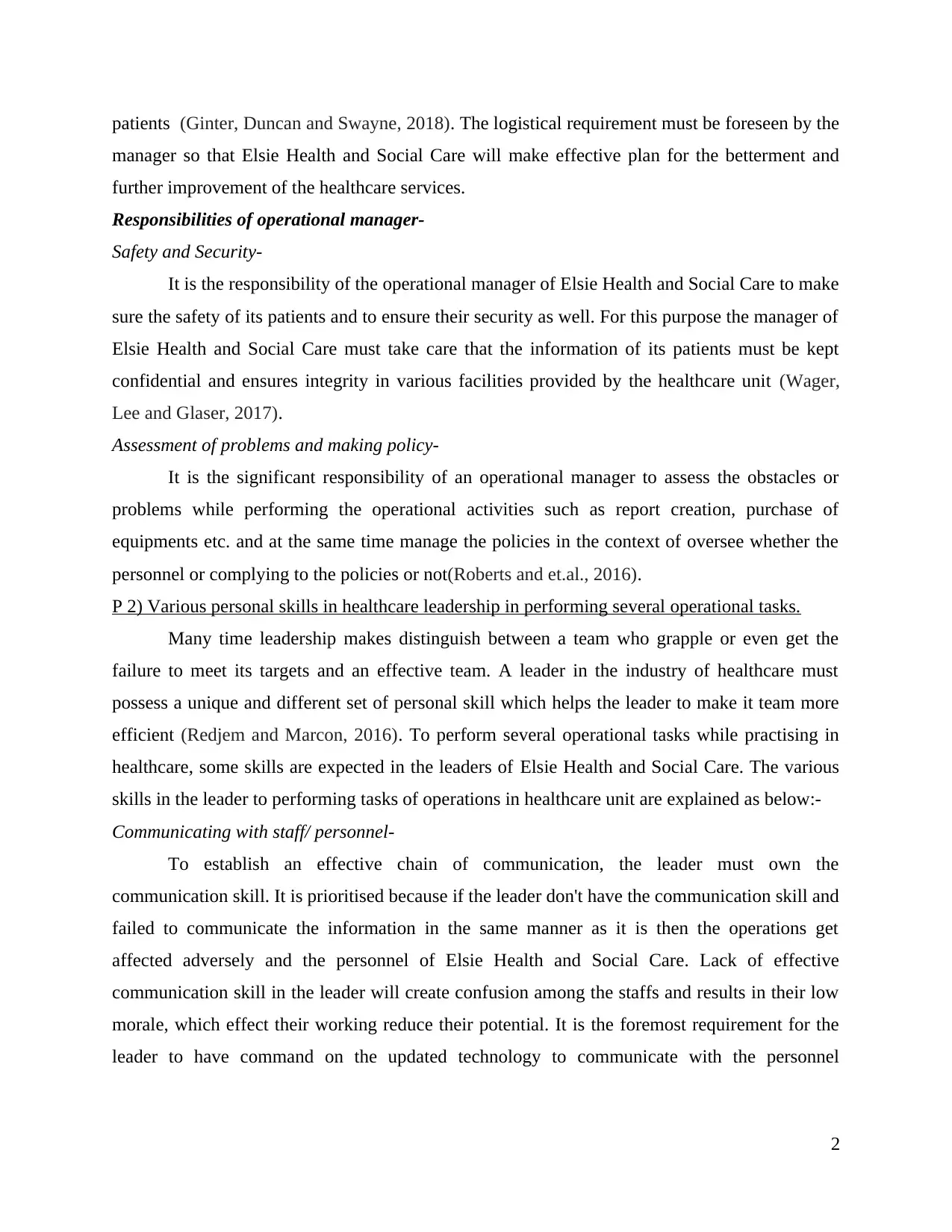
patients (Ginter, Duncan and Swayne, 2018). The logistical requirement must be foreseen by the
manager so that Elsie Health and Social Care will make effective plan for the betterment and
further improvement of the healthcare services.
Responsibilities of operational manager-
Safety and Security-
It is the responsibility of the operational manager of Elsie Health and Social Care to make
sure the safety of its patients and to ensure their security as well. For this purpose the manager of
Elsie Health and Social Care must take care that the information of its patients must be kept
confidential and ensures integrity in various facilities provided by the healthcare unit (Wager,
Lee and Glaser, 2017).
Assessment of problems and making policy-
It is the significant responsibility of an operational manager to assess the obstacles or
problems while performing the operational activities such as report creation, purchase of
equipments etc. and at the same time manage the policies in the context of oversee whether the
personnel or complying to the policies or not(Roberts and et.al., 2016).
P 2) Various personal skills in healthcare leadership in performing several operational tasks.
Many time leadership makes distinguish between a team who grapple or even get the
failure to meet its targets and an effective team. A leader in the industry of healthcare must
possess a unique and different set of personal skill which helps the leader to make it team more
efficient (Redjem and Marcon, 2016). To perform several operational tasks while practising in
healthcare, some skills are expected in the leaders of Elsie Health and Social Care. The various
skills in the leader to performing tasks of operations in healthcare unit are explained as below:-
Communicating with staff/ personnel-
To establish an effective chain of communication, the leader must own the
communication skill. It is prioritised because if the leader don't have the communication skill and
failed to communicate the information in the same manner as it is then the operations get
affected adversely and the personnel of Elsie Health and Social Care. Lack of effective
communication skill in the leader will create confusion among the staffs and results in their low
morale, which effect their working reduce their potential. It is the foremost requirement for the
leader to have command on the updated technology to communicate with the personnel
2
manager so that Elsie Health and Social Care will make effective plan for the betterment and
further improvement of the healthcare services.
Responsibilities of operational manager-
Safety and Security-
It is the responsibility of the operational manager of Elsie Health and Social Care to make
sure the safety of its patients and to ensure their security as well. For this purpose the manager of
Elsie Health and Social Care must take care that the information of its patients must be kept
confidential and ensures integrity in various facilities provided by the healthcare unit (Wager,
Lee and Glaser, 2017).
Assessment of problems and making policy-
It is the significant responsibility of an operational manager to assess the obstacles or
problems while performing the operational activities such as report creation, purchase of
equipments etc. and at the same time manage the policies in the context of oversee whether the
personnel or complying to the policies or not(Roberts and et.al., 2016).
P 2) Various personal skills in healthcare leadership in performing several operational tasks.
Many time leadership makes distinguish between a team who grapple or even get the
failure to meet its targets and an effective team. A leader in the industry of healthcare must
possess a unique and different set of personal skill which helps the leader to make it team more
efficient (Redjem and Marcon, 2016). To perform several operational tasks while practising in
healthcare, some skills are expected in the leaders of Elsie Health and Social Care. The various
skills in the leader to performing tasks of operations in healthcare unit are explained as below:-
Communicating with staff/ personnel-
To establish an effective chain of communication, the leader must own the
communication skill. It is prioritised because if the leader don't have the communication skill and
failed to communicate the information in the same manner as it is then the operations get
affected adversely and the personnel of Elsie Health and Social Care. Lack of effective
communication skill in the leader will create confusion among the staffs and results in their low
morale, which effect their working reduce their potential. It is the foremost requirement for the
leader to have command on the updated technology to communicate with the personnel
2
Paraphrase This Document
Need a fresh take? Get an instant paraphrase of this document with our AI Paraphraser
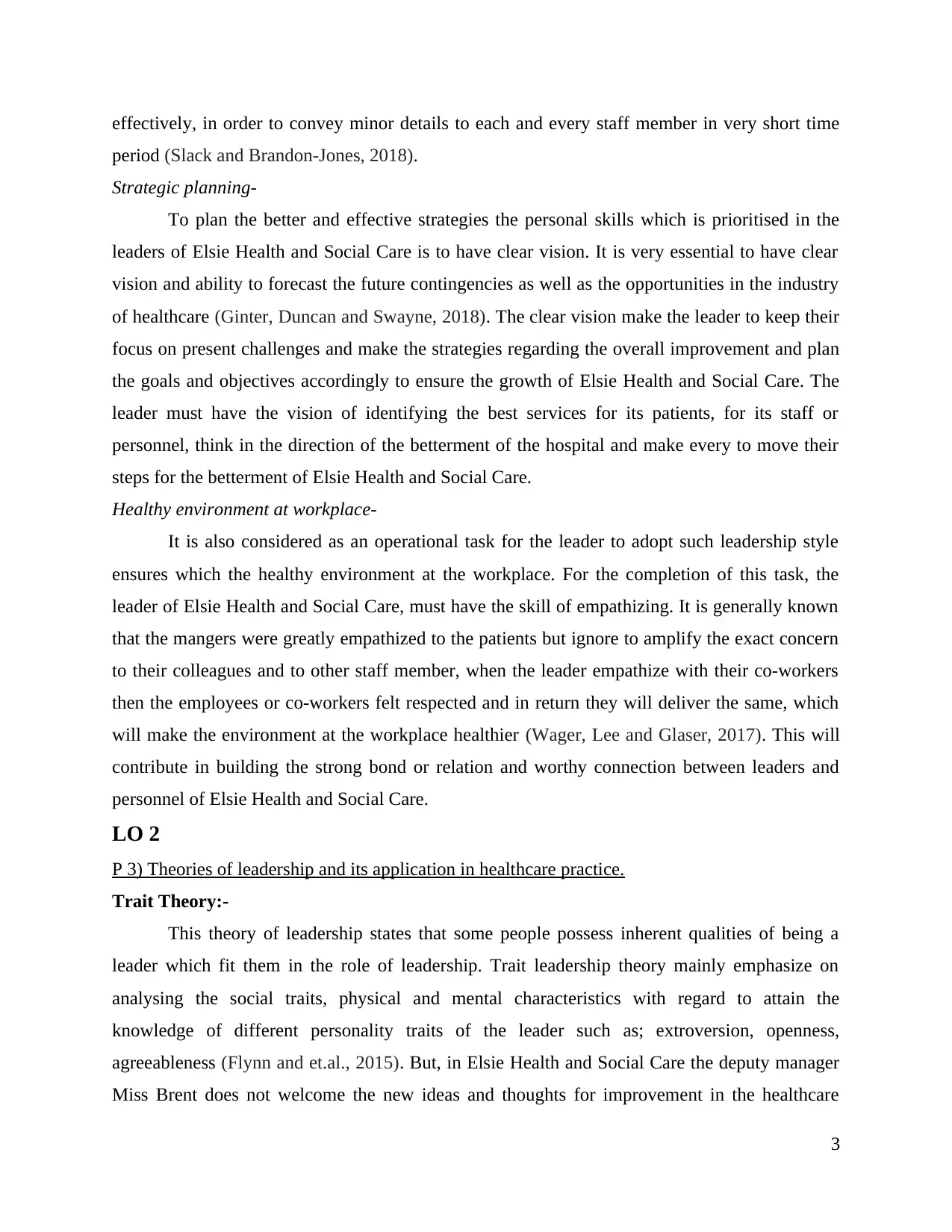
effectively, in order to convey minor details to each and every staff member in very short time
period (Slack and Brandon-Jones, 2018).
Strategic planning-
To plan the better and effective strategies the personal skills which is prioritised in the
leaders of Elsie Health and Social Care is to have clear vision. It is very essential to have clear
vision and ability to forecast the future contingencies as well as the opportunities in the industry
of healthcare (Ginter, Duncan and Swayne, 2018). The clear vision make the leader to keep their
focus on present challenges and make the strategies regarding the overall improvement and plan
the goals and objectives accordingly to ensure the growth of Elsie Health and Social Care. The
leader must have the vision of identifying the best services for its patients, for its staff or
personnel, think in the direction of the betterment of the hospital and make every to move their
steps for the betterment of Elsie Health and Social Care.
Healthy environment at workplace-
It is also considered as an operational task for the leader to adopt such leadership style
ensures which the healthy environment at the workplace. For the completion of this task, the
leader of Elsie Health and Social Care, must have the skill of empathizing. It is generally known
that the mangers were greatly empathized to the patients but ignore to amplify the exact concern
to their colleagues and to other staff member, when the leader empathize with their co-workers
then the employees or co-workers felt respected and in return they will deliver the same, which
will make the environment at the workplace healthier (Wager, Lee and Glaser, 2017). This will
contribute in building the strong bond or relation and worthy connection between leaders and
personnel of Elsie Health and Social Care.
LO 2
P 3) Theories of leadership and its application in healthcare practice.
Trait Theory:-
This theory of leadership states that some people possess inherent qualities of being a
leader which fit them in the role of leadership. Trait leadership theory mainly emphasize on
analysing the social traits, physical and mental characteristics with regard to attain the
knowledge of different personality traits of the leader such as; extroversion, openness,
agreeableness (Flynn and et.al., 2015). But, in Elsie Health and Social Care the deputy manager
Miss Brent does not welcome the new ideas and thoughts for improvement in the healthcare
3
period (Slack and Brandon-Jones, 2018).
Strategic planning-
To plan the better and effective strategies the personal skills which is prioritised in the
leaders of Elsie Health and Social Care is to have clear vision. It is very essential to have clear
vision and ability to forecast the future contingencies as well as the opportunities in the industry
of healthcare (Ginter, Duncan and Swayne, 2018). The clear vision make the leader to keep their
focus on present challenges and make the strategies regarding the overall improvement and plan
the goals and objectives accordingly to ensure the growth of Elsie Health and Social Care. The
leader must have the vision of identifying the best services for its patients, for its staff or
personnel, think in the direction of the betterment of the hospital and make every to move their
steps for the betterment of Elsie Health and Social Care.
Healthy environment at workplace-
It is also considered as an operational task for the leader to adopt such leadership style
ensures which the healthy environment at the workplace. For the completion of this task, the
leader of Elsie Health and Social Care, must have the skill of empathizing. It is generally known
that the mangers were greatly empathized to the patients but ignore to amplify the exact concern
to their colleagues and to other staff member, when the leader empathize with their co-workers
then the employees or co-workers felt respected and in return they will deliver the same, which
will make the environment at the workplace healthier (Wager, Lee and Glaser, 2017). This will
contribute in building the strong bond or relation and worthy connection between leaders and
personnel of Elsie Health and Social Care.
LO 2
P 3) Theories of leadership and its application in healthcare practice.
Trait Theory:-
This theory of leadership states that some people possess inherent qualities of being a
leader which fit them in the role of leadership. Trait leadership theory mainly emphasize on
analysing the social traits, physical and mental characteristics with regard to attain the
knowledge of different personality traits of the leader such as; extroversion, openness,
agreeableness (Flynn and et.al., 2015). But, in Elsie Health and Social Care the deputy manager
Miss Brent does not welcome the new ideas and thoughts for improvement in the healthcare
3
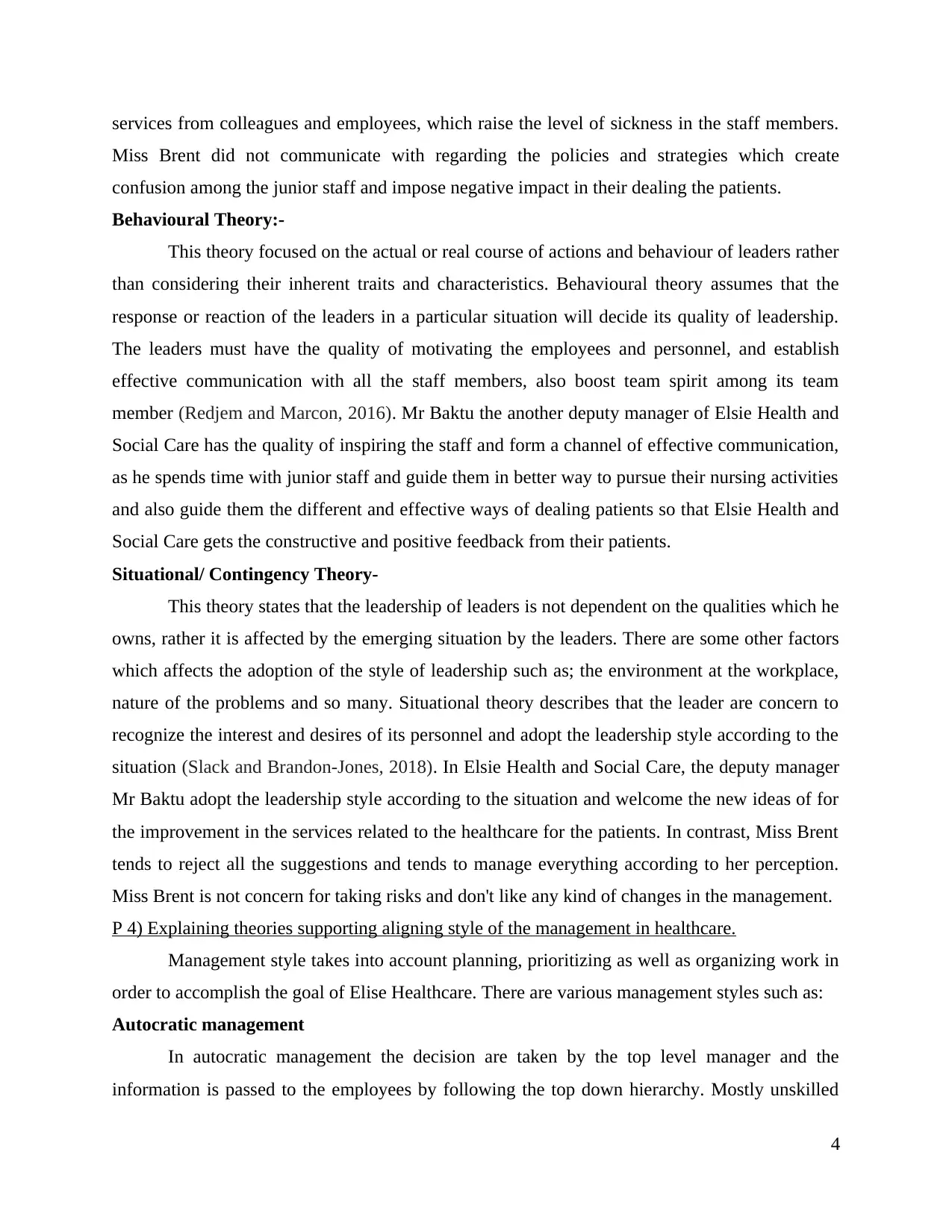
services from colleagues and employees, which raise the level of sickness in the staff members.
Miss Brent did not communicate with regarding the policies and strategies which create
confusion among the junior staff and impose negative impact in their dealing the patients.
Behavioural Theory:-
This theory focused on the actual or real course of actions and behaviour of leaders rather
than considering their inherent traits and characteristics. Behavioural theory assumes that the
response or reaction of the leaders in a particular situation will decide its quality of leadership.
The leaders must have the quality of motivating the employees and personnel, and establish
effective communication with all the staff members, also boost team spirit among its team
member (Redjem and Marcon, 2016). Mr Baktu the another deputy manager of Elsie Health and
Social Care has the quality of inspiring the staff and form a channel of effective communication,
as he spends time with junior staff and guide them in better way to pursue their nursing activities
and also guide them the different and effective ways of dealing patients so that Elsie Health and
Social Care gets the constructive and positive feedback from their patients.
Situational/ Contingency Theory-
This theory states that the leadership of leaders is not dependent on the qualities which he
owns, rather it is affected by the emerging situation by the leaders. There are some other factors
which affects the adoption of the style of leadership such as; the environment at the workplace,
nature of the problems and so many. Situational theory describes that the leader are concern to
recognize the interest and desires of its personnel and adopt the leadership style according to the
situation (Slack and Brandon-Jones, 2018). In Elsie Health and Social Care, the deputy manager
Mr Baktu adopt the leadership style according to the situation and welcome the new ideas of for
the improvement in the services related to the healthcare for the patients. In contrast, Miss Brent
tends to reject all the suggestions and tends to manage everything according to her perception.
Miss Brent is not concern for taking risks and don't like any kind of changes in the management.
P 4) Explaining theories supporting aligning style of the management in healthcare.
Management style takes into account planning, prioritizing as well as organizing work in
order to accomplish the goal of Elise Healthcare. There are various management styles such as:
Autocratic management
In autocratic management the decision are taken by the top level manager and the
information is passed to the employees by following the top down hierarchy. Mostly unskilled
4
Miss Brent did not communicate with regarding the policies and strategies which create
confusion among the junior staff and impose negative impact in their dealing the patients.
Behavioural Theory:-
This theory focused on the actual or real course of actions and behaviour of leaders rather
than considering their inherent traits and characteristics. Behavioural theory assumes that the
response or reaction of the leaders in a particular situation will decide its quality of leadership.
The leaders must have the quality of motivating the employees and personnel, and establish
effective communication with all the staff members, also boost team spirit among its team
member (Redjem and Marcon, 2016). Mr Baktu the another deputy manager of Elsie Health and
Social Care has the quality of inspiring the staff and form a channel of effective communication,
as he spends time with junior staff and guide them in better way to pursue their nursing activities
and also guide them the different and effective ways of dealing patients so that Elsie Health and
Social Care gets the constructive and positive feedback from their patients.
Situational/ Contingency Theory-
This theory states that the leadership of leaders is not dependent on the qualities which he
owns, rather it is affected by the emerging situation by the leaders. There are some other factors
which affects the adoption of the style of leadership such as; the environment at the workplace,
nature of the problems and so many. Situational theory describes that the leader are concern to
recognize the interest and desires of its personnel and adopt the leadership style according to the
situation (Slack and Brandon-Jones, 2018). In Elsie Health and Social Care, the deputy manager
Mr Baktu adopt the leadership style according to the situation and welcome the new ideas of for
the improvement in the services related to the healthcare for the patients. In contrast, Miss Brent
tends to reject all the suggestions and tends to manage everything according to her perception.
Miss Brent is not concern for taking risks and don't like any kind of changes in the management.
P 4) Explaining theories supporting aligning style of the management in healthcare.
Management style takes into account planning, prioritizing as well as organizing work in
order to accomplish the goal of Elise Healthcare. There are various management styles such as:
Autocratic management
In autocratic management the decision are taken by the top level manager and the
information is passed to the employees by following the top down hierarchy. Mostly unskilled
4
⊘ This is a preview!⊘
Do you want full access?
Subscribe today to unlock all pages.

Trusted by 1+ million students worldwide

and semi-skilled employees are benefited from this style. The employees will be cleared what are
the roles of them without consulting with them in the healthcare. The theory of Behavioural will
support the style of management by letting the management know what are the behaviours of the
employee and accordingly the roles and responsibilities of them will be designed by the top
managers (Flynn and et.al., 2015).
Authoritative style
In this style the employees will take participation in the management decision in which
they are allowed to ask to the top manager if the role is not suitable to them in the Elise
healthcare. As per this style management used to trust the employees by allowing them to
participate in decision making. This style needs consistent teaching of the employees and also
consistent supervision of the employees. Contingency management theory will support this style
by changing the employee role as per the contingent situation or circumstances. The employees
will be provided motivation to switch another job by telling the employees benefits of the job
role and future opportunities in the job (Choi, Wallace and Wang, 2018).
Persuasive style
As per this style the managers used to take the decision own their own. But the leader
convince the employees that the decision taken by the manager is at the best interest of them.
This style is important because it built trust in the employees. Trait theory will support
Persuasive style by letting the Elise Healthcare know the social as well as psychological
behaviour of the employees which will help the operation manager design job roles which are
similar to the profile of the employees. If the employees are having any issue then the manager
will resolve the issue by showing them the growth in the present job this will persuade the
employees to continue the job. This theory will also support the style by planning and organising
the best suited job roles which a leader must implement after looking at the similar profile of the
employees (Slack, 2018).
Democratic style
Democratic management style is the style which involves managers to take final decision
after consulting with the employees. Employee participation is must as per this style. The style
helps in getting innovative and new ideas from the employees like cost cutting ideas by using the
two bed at the same place. The style also helps the employees by building in them courage
honesty and intelligence. The Transactional Leadership Theory will support the Democratic style
5
the roles of them without consulting with them in the healthcare. The theory of Behavioural will
support the style of management by letting the management know what are the behaviours of the
employee and accordingly the roles and responsibilities of them will be designed by the top
managers (Flynn and et.al., 2015).
Authoritative style
In this style the employees will take participation in the management decision in which
they are allowed to ask to the top manager if the role is not suitable to them in the Elise
healthcare. As per this style management used to trust the employees by allowing them to
participate in decision making. This style needs consistent teaching of the employees and also
consistent supervision of the employees. Contingency management theory will support this style
by changing the employee role as per the contingent situation or circumstances. The employees
will be provided motivation to switch another job by telling the employees benefits of the job
role and future opportunities in the job (Choi, Wallace and Wang, 2018).
Persuasive style
As per this style the managers used to take the decision own their own. But the leader
convince the employees that the decision taken by the manager is at the best interest of them.
This style is important because it built trust in the employees. Trait theory will support
Persuasive style by letting the Elise Healthcare know the social as well as psychological
behaviour of the employees which will help the operation manager design job roles which are
similar to the profile of the employees. If the employees are having any issue then the manager
will resolve the issue by showing them the growth in the present job this will persuade the
employees to continue the job. This theory will also support the style by planning and organising
the best suited job roles which a leader must implement after looking at the similar profile of the
employees (Slack, 2018).
Democratic style
Democratic management style is the style which involves managers to take final decision
after consulting with the employees. Employee participation is must as per this style. The style
helps in getting innovative and new ideas from the employees like cost cutting ideas by using the
two bed at the same place. The style also helps the employees by building in them courage
honesty and intelligence. The Transactional Leadership Theory will support the Democratic style
5
Paraphrase This Document
Need a fresh take? Get an instant paraphrase of this document with our AI Paraphraser
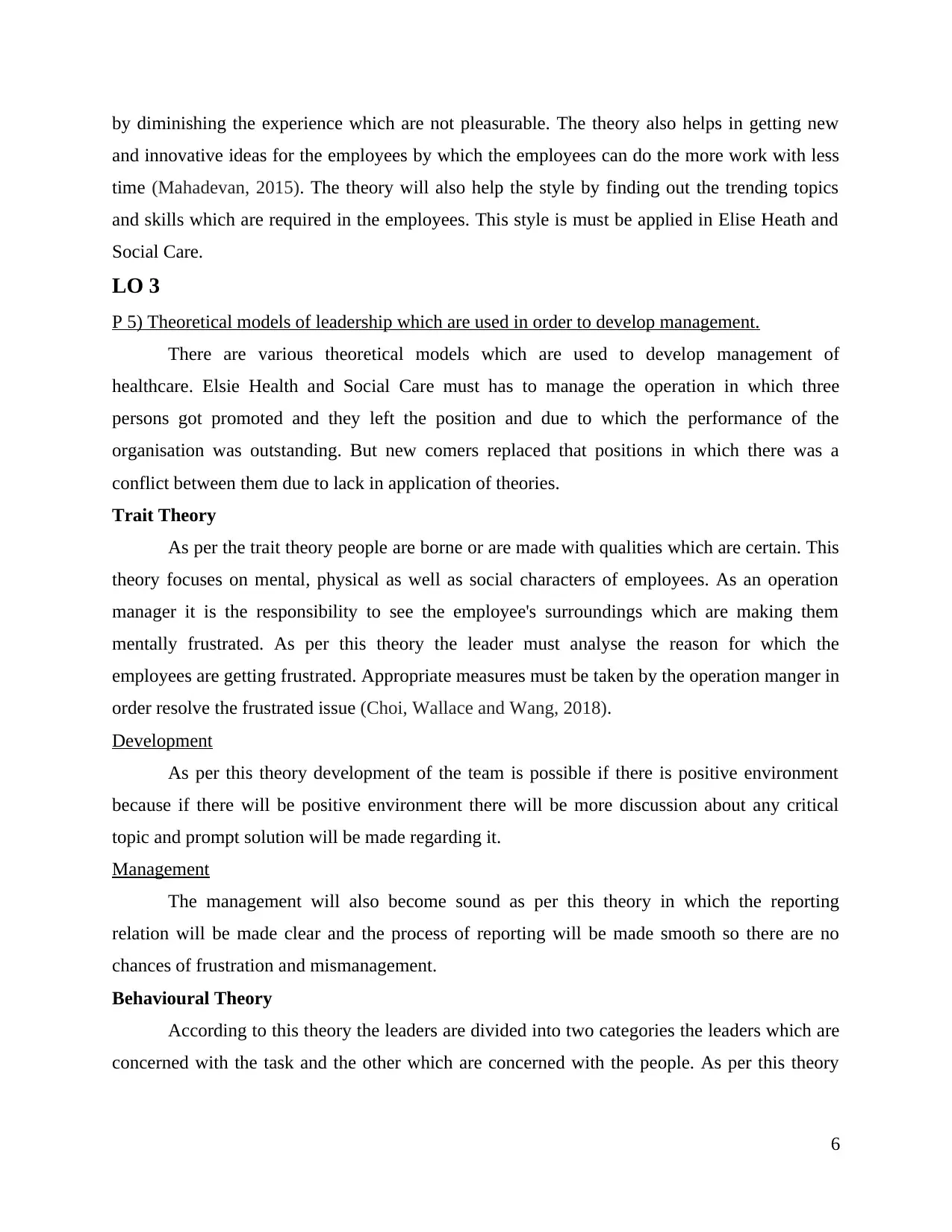
by diminishing the experience which are not pleasurable. The theory also helps in getting new
and innovative ideas for the employees by which the employees can do the more work with less
time (Mahadevan, 2015). The theory will also help the style by finding out the trending topics
and skills which are required in the employees. This style is must be applied in Elise Heath and
Social Care.
LO 3
P 5) Theoretical models of leadership which are used in order to develop management.
There are various theoretical models which are used to develop management of
healthcare. Elsie Health and Social Care must has to manage the operation in which three
persons got promoted and they left the position and due to which the performance of the
organisation was outstanding. But new comers replaced that positions in which there was a
conflict between them due to lack in application of theories.
Trait Theory
As per the trait theory people are borne or are made with qualities which are certain. This
theory focuses on mental, physical as well as social characters of employees. As an operation
manager it is the responsibility to see the employee's surroundings which are making them
mentally frustrated. As per this theory the leader must analyse the reason for which the
employees are getting frustrated. Appropriate measures must be taken by the operation manger in
order resolve the frustrated issue (Choi, Wallace and Wang, 2018).
Development
As per this theory development of the team is possible if there is positive environment
because if there will be positive environment there will be more discussion about any critical
topic and prompt solution will be made regarding it.
Management
The management will also become sound as per this theory in which the reporting
relation will be made clear and the process of reporting will be made smooth so there are no
chances of frustration and mismanagement.
Behavioural Theory
According to this theory the leaders are divided into two categories the leaders which are
concerned with the task and the other which are concerned with the people. As per this theory
6
and innovative ideas for the employees by which the employees can do the more work with less
time (Mahadevan, 2015). The theory will also help the style by finding out the trending topics
and skills which are required in the employees. This style is must be applied in Elise Heath and
Social Care.
LO 3
P 5) Theoretical models of leadership which are used in order to develop management.
There are various theoretical models which are used to develop management of
healthcare. Elsie Health and Social Care must has to manage the operation in which three
persons got promoted and they left the position and due to which the performance of the
organisation was outstanding. But new comers replaced that positions in which there was a
conflict between them due to lack in application of theories.
Trait Theory
As per the trait theory people are borne or are made with qualities which are certain. This
theory focuses on mental, physical as well as social characters of employees. As an operation
manager it is the responsibility to see the employee's surroundings which are making them
mentally frustrated. As per this theory the leader must analyse the reason for which the
employees are getting frustrated. Appropriate measures must be taken by the operation manger in
order resolve the frustrated issue (Choi, Wallace and Wang, 2018).
Development
As per this theory development of the team is possible if there is positive environment
because if there will be positive environment there will be more discussion about any critical
topic and prompt solution will be made regarding it.
Management
The management will also become sound as per this theory in which the reporting
relation will be made clear and the process of reporting will be made smooth so there are no
chances of frustration and mismanagement.
Behavioural Theory
According to this theory the leaders are divided into two categories the leaders which are
concerned with the task and the other which are concerned with the people. As per this theory
6
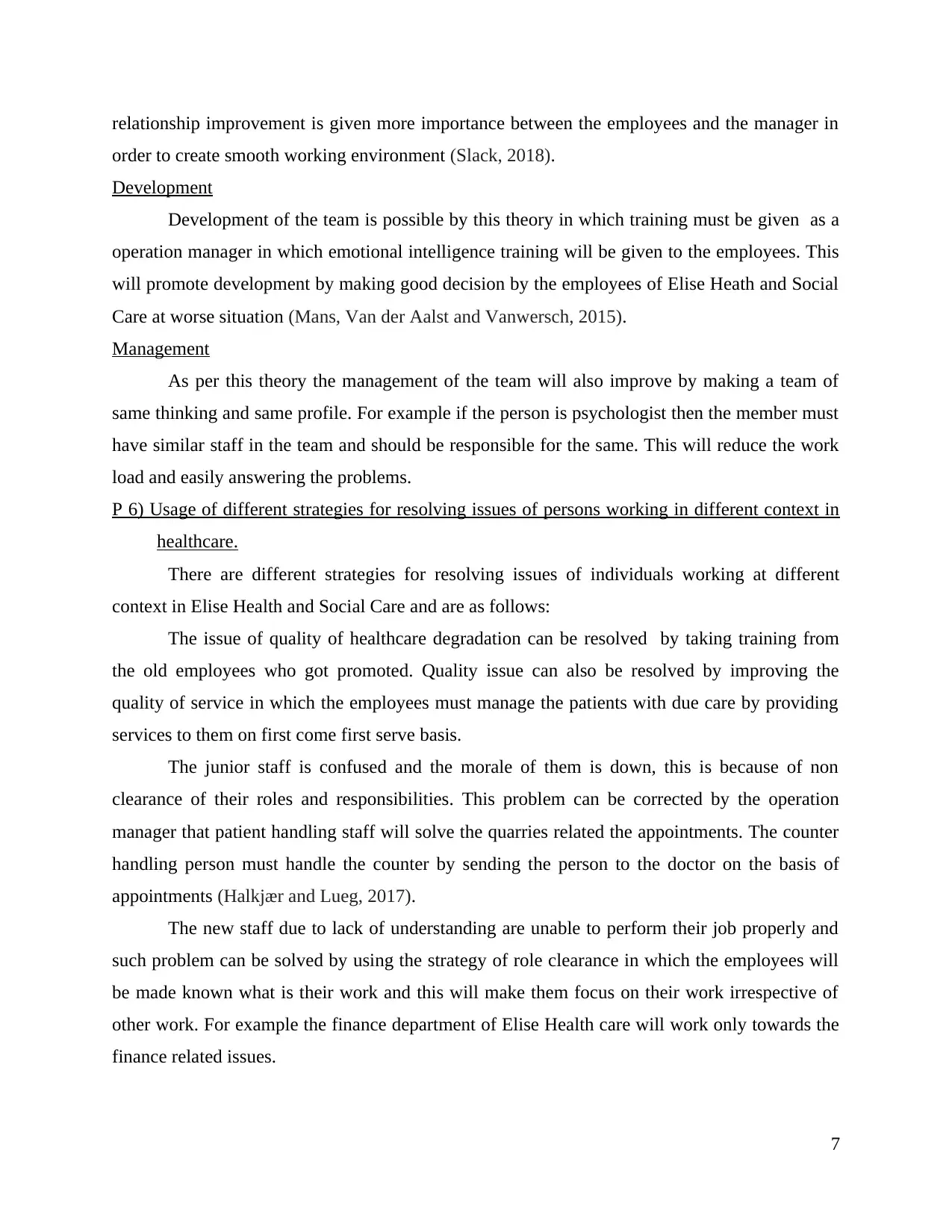
relationship improvement is given more importance between the employees and the manager in
order to create smooth working environment (Slack, 2018).
Development
Development of the team is possible by this theory in which training must be given as a
operation manager in which emotional intelligence training will be given to the employees. This
will promote development by making good decision by the employees of Elise Heath and Social
Care at worse situation (Mans, Van der Aalst and Vanwersch, 2015).
Management
As per this theory the management of the team will also improve by making a team of
same thinking and same profile. For example if the person is psychologist then the member must
have similar staff in the team and should be responsible for the same. This will reduce the work
load and easily answering the problems.
P 6) Usage of different strategies for resolving issues of persons working in different context in
healthcare.
There are different strategies for resolving issues of individuals working at different
context in Elise Health and Social Care and are as follows:
The issue of quality of healthcare degradation can be resolved by taking training from
the old employees who got promoted. Quality issue can also be resolved by improving the
quality of service in which the employees must manage the patients with due care by providing
services to them on first come first serve basis.
The junior staff is confused and the morale of them is down, this is because of non
clearance of their roles and responsibilities. This problem can be corrected by the operation
manager that patient handling staff will solve the quarries related the appointments. The counter
handling person must handle the counter by sending the person to the doctor on the basis of
appointments (Halkjær and Lueg, 2017).
The new staff due to lack of understanding are unable to perform their job properly and
such problem can be solved by using the strategy of role clearance in which the employees will
be made known what is their work and this will make them focus on their work irrespective of
other work. For example the finance department of Elise Health care will work only towards the
finance related issues.
7
order to create smooth working environment (Slack, 2018).
Development
Development of the team is possible by this theory in which training must be given as a
operation manager in which emotional intelligence training will be given to the employees. This
will promote development by making good decision by the employees of Elise Heath and Social
Care at worse situation (Mans, Van der Aalst and Vanwersch, 2015).
Management
As per this theory the management of the team will also improve by making a team of
same thinking and same profile. For example if the person is psychologist then the member must
have similar staff in the team and should be responsible for the same. This will reduce the work
load and easily answering the problems.
P 6) Usage of different strategies for resolving issues of persons working in different context in
healthcare.
There are different strategies for resolving issues of individuals working at different
context in Elise Health and Social Care and are as follows:
The issue of quality of healthcare degradation can be resolved by taking training from
the old employees who got promoted. Quality issue can also be resolved by improving the
quality of service in which the employees must manage the patients with due care by providing
services to them on first come first serve basis.
The junior staff is confused and the morale of them is down, this is because of non
clearance of their roles and responsibilities. This problem can be corrected by the operation
manager that patient handling staff will solve the quarries related the appointments. The counter
handling person must handle the counter by sending the person to the doctor on the basis of
appointments (Halkjær and Lueg, 2017).
The new staff due to lack of understanding are unable to perform their job properly and
such problem can be solved by using the strategy of role clearance in which the employees will
be made known what is their work and this will make them focus on their work irrespective of
other work. For example the finance department of Elise Health care will work only towards the
finance related issues.
7
⊘ This is a preview!⊘
Do you want full access?
Subscribe today to unlock all pages.

Trusted by 1+ million students worldwide
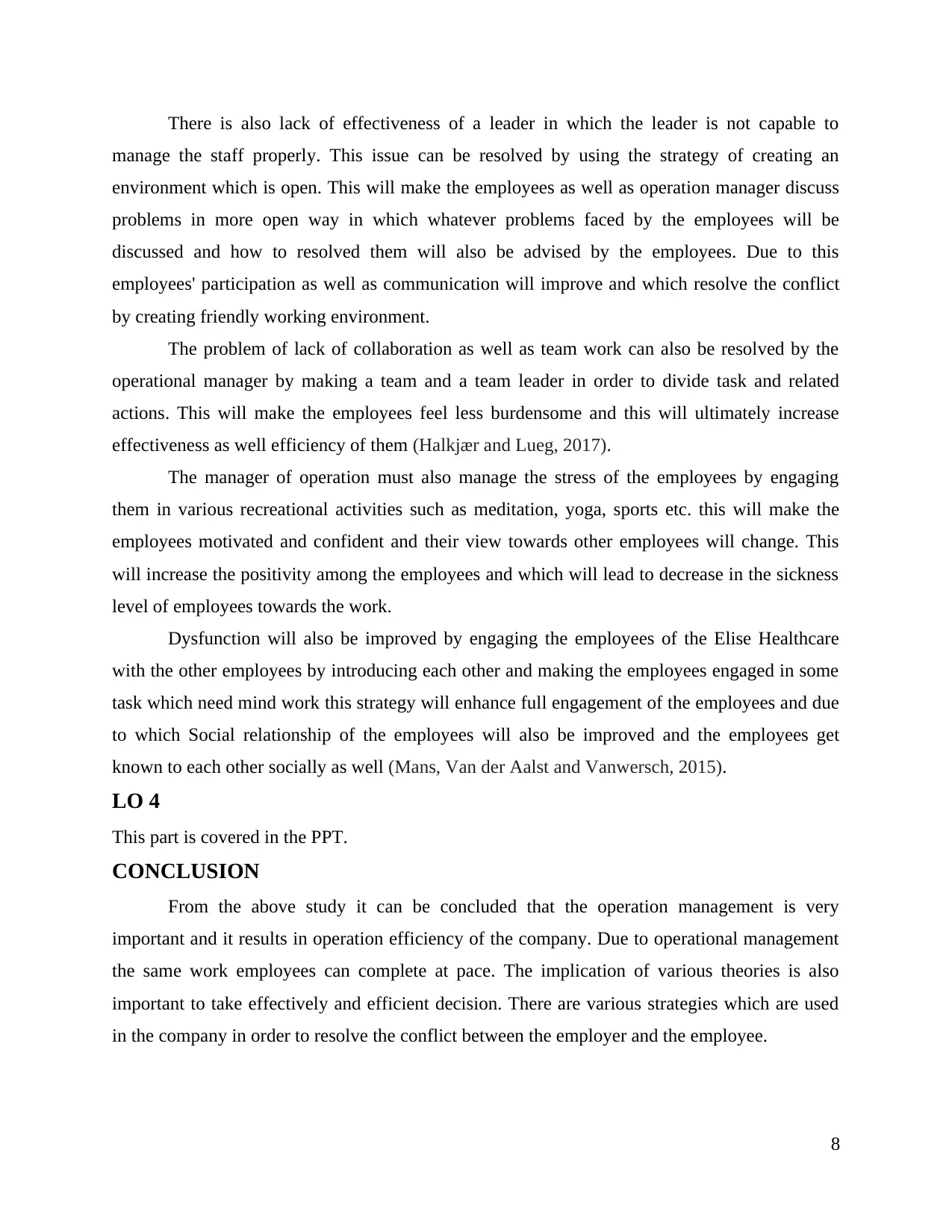
There is also lack of effectiveness of a leader in which the leader is not capable to
manage the staff properly. This issue can be resolved by using the strategy of creating an
environment which is open. This will make the employees as well as operation manager discuss
problems in more open way in which whatever problems faced by the employees will be
discussed and how to resolved them will also be advised by the employees. Due to this
employees' participation as well as communication will improve and which resolve the conflict
by creating friendly working environment.
The problem of lack of collaboration as well as team work can also be resolved by the
operational manager by making a team and a team leader in order to divide task and related
actions. This will make the employees feel less burdensome and this will ultimately increase
effectiveness as well efficiency of them (Halkjær and Lueg, 2017).
The manager of operation must also manage the stress of the employees by engaging
them in various recreational activities such as meditation, yoga, sports etc. this will make the
employees motivated and confident and their view towards other employees will change. This
will increase the positivity among the employees and which will lead to decrease in the sickness
level of employees towards the work.
Dysfunction will also be improved by engaging the employees of the Elise Healthcare
with the other employees by introducing each other and making the employees engaged in some
task which need mind work this strategy will enhance full engagement of the employees and due
to which Social relationship of the employees will also be improved and the employees get
known to each other socially as well (Mans, Van der Aalst and Vanwersch, 2015).
LO 4
This part is covered in the PPT.
CONCLUSION
From the above study it can be concluded that the operation management is very
important and it results in operation efficiency of the company. Due to operational management
the same work employees can complete at pace. The implication of various theories is also
important to take effectively and efficient decision. There are various strategies which are used
in the company in order to resolve the conflict between the employer and the employee.
8
manage the staff properly. This issue can be resolved by using the strategy of creating an
environment which is open. This will make the employees as well as operation manager discuss
problems in more open way in which whatever problems faced by the employees will be
discussed and how to resolved them will also be advised by the employees. Due to this
employees' participation as well as communication will improve and which resolve the conflict
by creating friendly working environment.
The problem of lack of collaboration as well as team work can also be resolved by the
operational manager by making a team and a team leader in order to divide task and related
actions. This will make the employees feel less burdensome and this will ultimately increase
effectiveness as well efficiency of them (Halkjær and Lueg, 2017).
The manager of operation must also manage the stress of the employees by engaging
them in various recreational activities such as meditation, yoga, sports etc. this will make the
employees motivated and confident and their view towards other employees will change. This
will increase the positivity among the employees and which will lead to decrease in the sickness
level of employees towards the work.
Dysfunction will also be improved by engaging the employees of the Elise Healthcare
with the other employees by introducing each other and making the employees engaged in some
task which need mind work this strategy will enhance full engagement of the employees and due
to which Social relationship of the employees will also be improved and the employees get
known to each other socially as well (Mans, Van der Aalst and Vanwersch, 2015).
LO 4
This part is covered in the PPT.
CONCLUSION
From the above study it can be concluded that the operation management is very
important and it results in operation efficiency of the company. Due to operational management
the same work employees can complete at pace. The implication of various theories is also
important to take effectively and efficient decision. There are various strategies which are used
in the company in order to resolve the conflict between the employer and the employee.
8
Paraphrase This Document
Need a fresh take? Get an instant paraphrase of this document with our AI Paraphraser
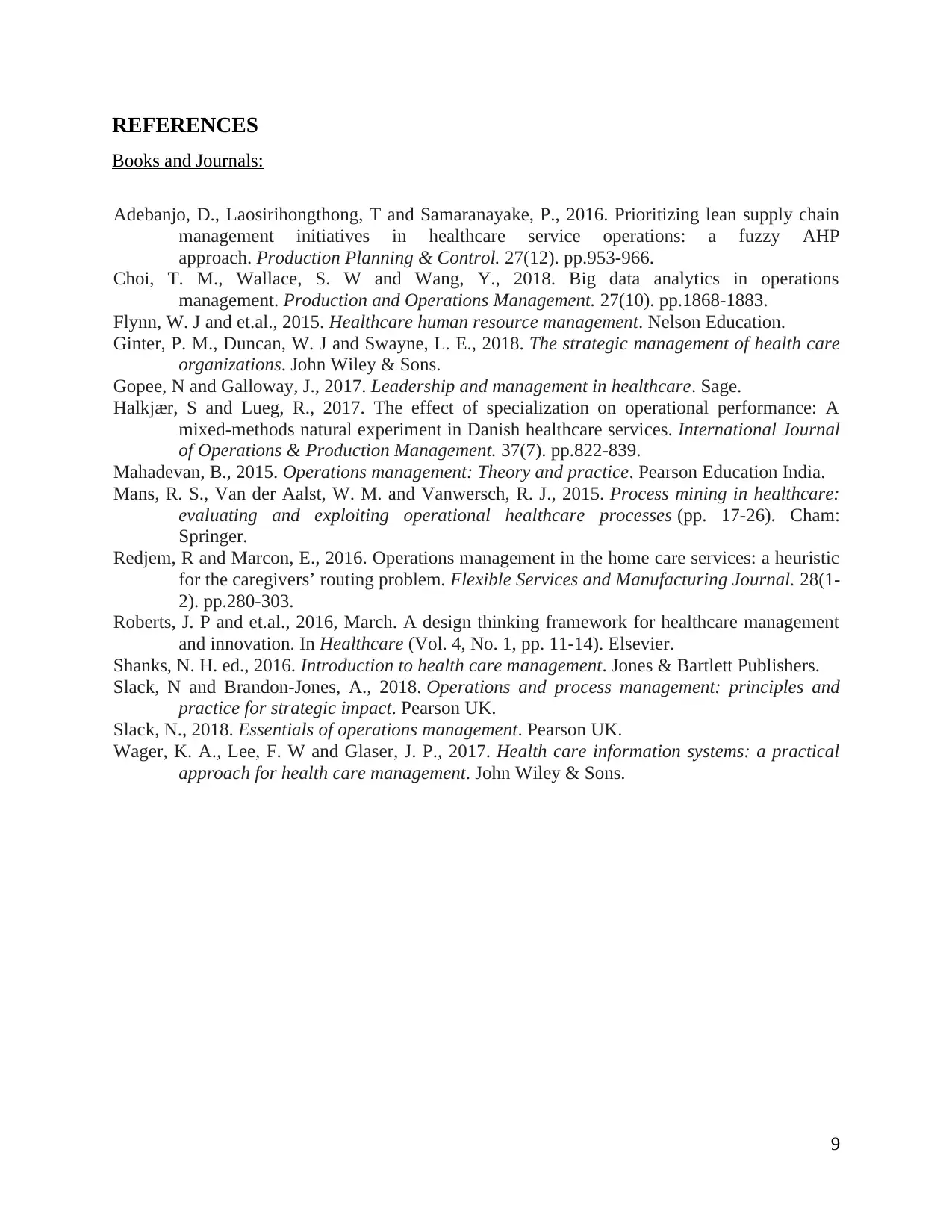
REFERENCES
Books and Journals:
Adebanjo, D., Laosirihongthong, T and Samaranayake, P., 2016. Prioritizing lean supply chain
management initiatives in healthcare service operations: a fuzzy AHP
approach. Production Planning & Control. 27(12). pp.953-966.
Choi, T. M., Wallace, S. W and Wang, Y., 2018. Big data analytics in operations
management. Production and Operations Management. 27(10). pp.1868-1883.
Flynn, W. J and et.al., 2015. Healthcare human resource management. Nelson Education.
Ginter, P. M., Duncan, W. J and Swayne, L. E., 2018. The strategic management of health care
organizations. John Wiley & Sons.
Gopee, N and Galloway, J., 2017. Leadership and management in healthcare. Sage.
Halkjær, S and Lueg, R., 2017. The effect of specialization on operational performance: A
mixed-methods natural experiment in Danish healthcare services. International Journal
of Operations & Production Management. 37(7). pp.822-839.
Mahadevan, B., 2015. Operations management: Theory and practice. Pearson Education India.
Mans, R. S., Van der Aalst, W. M. and Vanwersch, R. J., 2015. Process mining in healthcare:
evaluating and exploiting operational healthcare processes (pp. 17-26). Cham:
Springer.
Redjem, R and Marcon, E., 2016. Operations management in the home care services: a heuristic
for the caregivers’ routing problem. Flexible Services and Manufacturing Journal. 28(1-
2). pp.280-303.
Roberts, J. P and et.al., 2016, March. A design thinking framework for healthcare management
and innovation. In Healthcare (Vol. 4, No. 1, pp. 11-14). Elsevier.
Shanks, N. H. ed., 2016. Introduction to health care management. Jones & Bartlett Publishers.
Slack, N and Brandon-Jones, A., 2018. Operations and process management: principles and
practice for strategic impact. Pearson UK.
Slack, N., 2018. Essentials of operations management. Pearson UK.
Wager, K. A., Lee, F. W and Glaser, J. P., 2017. Health care information systems: a practical
approach for health care management. John Wiley & Sons.
9
Books and Journals:
Adebanjo, D., Laosirihongthong, T and Samaranayake, P., 2016. Prioritizing lean supply chain
management initiatives in healthcare service operations: a fuzzy AHP
approach. Production Planning & Control. 27(12). pp.953-966.
Choi, T. M., Wallace, S. W and Wang, Y., 2018. Big data analytics in operations
management. Production and Operations Management. 27(10). pp.1868-1883.
Flynn, W. J and et.al., 2015. Healthcare human resource management. Nelson Education.
Ginter, P. M., Duncan, W. J and Swayne, L. E., 2018. The strategic management of health care
organizations. John Wiley & Sons.
Gopee, N and Galloway, J., 2017. Leadership and management in healthcare. Sage.
Halkjær, S and Lueg, R., 2017. The effect of specialization on operational performance: A
mixed-methods natural experiment in Danish healthcare services. International Journal
of Operations & Production Management. 37(7). pp.822-839.
Mahadevan, B., 2015. Operations management: Theory and practice. Pearson Education India.
Mans, R. S., Van der Aalst, W. M. and Vanwersch, R. J., 2015. Process mining in healthcare:
evaluating and exploiting operational healthcare processes (pp. 17-26). Cham:
Springer.
Redjem, R and Marcon, E., 2016. Operations management in the home care services: a heuristic
for the caregivers’ routing problem. Flexible Services and Manufacturing Journal. 28(1-
2). pp.280-303.
Roberts, J. P and et.al., 2016, March. A design thinking framework for healthcare management
and innovation. In Healthcare (Vol. 4, No. 1, pp. 11-14). Elsevier.
Shanks, N. H. ed., 2016. Introduction to health care management. Jones & Bartlett Publishers.
Slack, N and Brandon-Jones, A., 2018. Operations and process management: principles and
practice for strategic impact. Pearson UK.
Slack, N., 2018. Essentials of operations management. Pearson UK.
Wager, K. A., Lee, F. W and Glaser, J. P., 2017. Health care information systems: a practical
approach for health care management. John Wiley & Sons.
9
1 out of 11
Related Documents
Your All-in-One AI-Powered Toolkit for Academic Success.
+13062052269
info@desklib.com
Available 24*7 on WhatsApp / Email
![[object Object]](/_next/static/media/star-bottom.7253800d.svg)
Unlock your academic potential
Copyright © 2020–2026 A2Z Services. All Rights Reserved. Developed and managed by ZUCOL.





